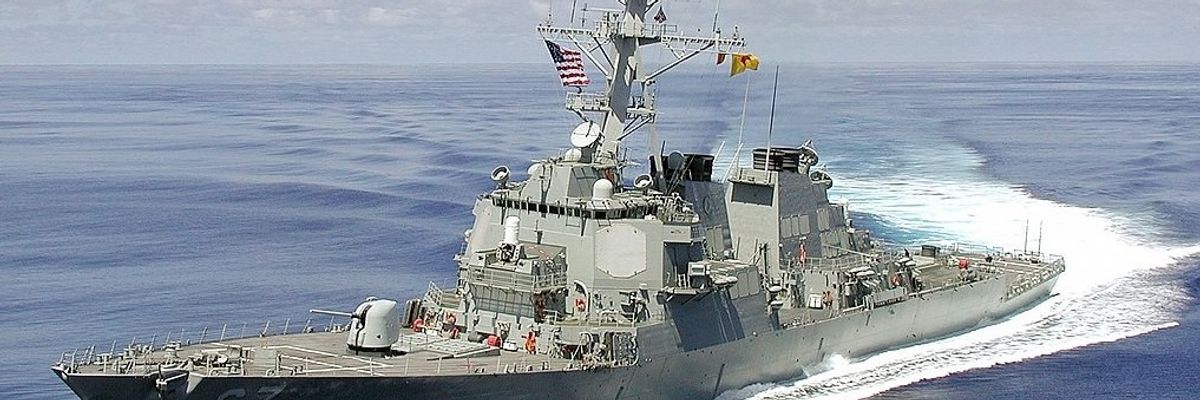On Wednesday, U.S. Defense Secretary Lloyd Austin announced that the United States would send the USS Cole, a guided missile destroyer, as well as 5th Generation fighter aircraft, to assist in shooting down missiles and drones fired at the UAE by Yemen’s Houthi rebels.
The announcement comes as the Biden administration considers whether or not to re-designate the Houthis a foreign terrorist organization after Houthi missiles killed three people in Abu Dhabi on January 17, and additional attacks aimed at the U.S. Air Force base al-Dhafra were deflected by U.S. Patriot anti-missile defenses on January 24.
The Biden administration has stated its commitment to assisting the UAE, as well as Saudi Arabia, to defend against Houthi attacks. The UAE, as well as Saudi Arabia, would like the U.S. to do this by re-designating the Houthis as terrorists. Sending additional U.S. military assets to assist the UAE instead may reflect Biden’s unwillingness to re-impose the terrorist designation.
The Houthis’ designation was one of the final acts of the out-going Trump administration. It drew significant criticism from humanitarian organizations, diplomats, and some members of Congress, based on the devastating humanitarian impact of preventing the distribution of aid to Yemenis living under Houthi control. Lifting it was one of Biden’s first decisions as president.
Yet with Houthi attacks now threatening U.S. troops stationed at al-Dhafra, Biden may reimpose the designation, although it is not clear if that would deter the Houthis. What is clear is that 25 million of Yemen’s 30 million inhabitants would lose access not only to food aid, but to any semblance of a functioning economy. The designation would place responsibility for the starvation of Yemenis squarely on the shoulders of the U.S., absolving the Houthis of their significant role in contributing to Yemen’s misery. The move could even bolster the group’s credibility, which they seek to establish on the basis of defending Yemen against Saudi, Emirati, and American aggression.
Wisely unwilling, so far, to reverse his position on the designation of the Houthis, Biden has turned instead to increasing the U.S. military’s role in defending the UAE. Yet by doing so, the president has put more U.S. military personnel and assets into harm's way. Although air defenses have thus far been able to prevent the majority of Houthi drones and missiles fired at the UAE and at Saudi Arabia from causing more significant casualties, these systems are not perfect.
If a U.S. service-member is killed by a Houthi attack, would Biden escalate to a full-blown war against the Houthis? This would directly contradict Biden’s stated intent to withdraw from unnecessary conflicts in the Middle East such as Afghanistan, and refocus the U.S. military’s attention on more pressing security threats. For the Biden administration, such threats include China and Russia, although arguably climate change and COVID-19 more directly threaten Americans’ security and way of life.
Unfortunately, the Biden administration appears to have concluded that in order to combat the perceived threat of China’s expansion, the U.S. must maintain and even enhance relations with American security partners in the Middle East. As a result, the preferences of Saudi Arabia and the UAE are more likely to dictate U.S. policy than American interests, embroiling the U.S. more firmly in a region where most Americans are eager to avoid unnecessary military engagement following two decades of failed wars.
In an interesting bit of irony, the Naval destroyer the U.S. is deploying to the UAE, the USS Cole, is the same ship that Al-Qaeda attacked off the coast of Yemen in October 2000. 17 sailors died and 37 were injured in the most significant attack Al-Qaeda carried out on an American target prior to 9/11.
U.S. policy in Yemen was once dictated by efforts to combat Al-Qaeda in the Arabian Peninsula (AQAP). According to Brian Jenkins of RAND, the Houthi insurgency has been AQAP’s “most determined and effective foe.” For that reason, the U.S. might wish to strengthen Houthi efforts to combat Al-Qaeda rather than become further involved in a conflict that contributes to the destruction of Yemen, creating additional opportunities for Al-Qaeda to reconvene. Instead, the deployment of the same ship Al-Qaeda attacked symbolizes the tortured logic of U.S. policy in the Middle East.















